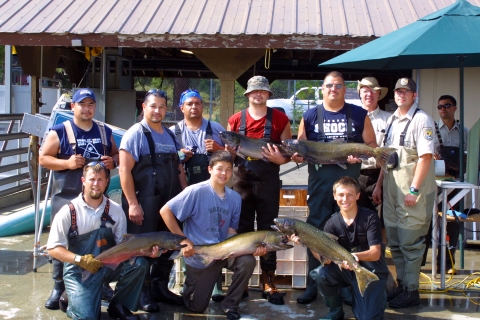Laws and Regulations
Trust Responsibilities to Native American Tribes are described by the Indian Trust Doctrine, which was developed by the U.S. Supreme Court. The doctrine articulates the trust responsibility that the Federal Government has in relation to Native Americans.
Under Secretarial Order 3206 (signed by both the Secretary of the Interior and the Secretary of Commerce), American Indian Tribal Rights, Federal-Tribal Trust Responsibilities, it is recognized that the USFWS has trust responsibilities with respect to tribes. We are committed to our Tribal Trust Responsibilities to Native American Tribes as described by the Indian Trust Doctrine, developed in 1973 by the US Supreme Court and mandated in Secretarial Order #3206. The doctrine describes the trust responsibility that the Federal Government has in relation to Native Americans: in essence, a legal obligation to act in the Tribe's best interests, including duties to protect Tribal lands, fishing and hunting rights, and cultural and natural resources.
Adult salmon returning to our hatchery are an important component of tribal fisheries activities. The focus of the fishery is the large pool located below the spillway. The character of the river here provides access to construct traditional scaffolds and fishing platforms. This fishery is important to tribal members as one of the few remaining places in Washington State that offers a productive fishing opportunity using traditional methods.
The Tribes are our partners in fish culture. The Yakama Nation is working to help build populations of coho salmon. They raise coho partially at our hatchery. The Confederated Tribes of the Colville run Chief Joseph Hatchery, the final hatchery built to mitigate for the impact of the Grand Coulee Dam. During the intense summer heat of 2015, when hundreds of thousands of spring Chinook salmon fingerlings at our hatchery were at risk, Chief Joe provided an alternate, temporary home for 250,000 of them.

